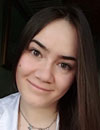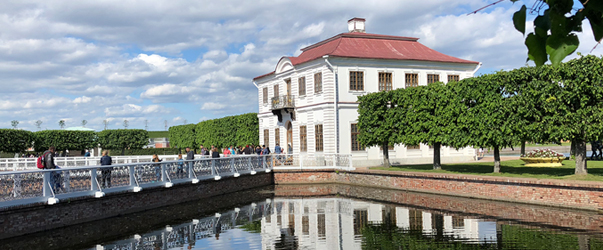
Aleksandra Rovnaya, MD
Russia Chapter Chair
From my early childhood I wanted to become a someone who would help others. At first, I wanted to help animals and become a veterinarian, but to become a human doctor seemed to be more difficult. So, in high school I decided to take up that challenge. After I became a medical doctor and got my specializations in rehabilitation medicine and pediatrics, I wanted more than just to be a doctor. I wanted to develop medicine in my country and to create solutions for patient problems. This led to further education in healthcare management and a position as Deputy Director at the Association of Private Clinics of St Petersburg. Still, I felt there was more I could do.
And then one day, in 2014, while doing a lecture translation for German and French specialists in compression garments, I met for the first time in my life several patients with lymphedema who were searching for help to treat their condition. For me, this was the greatest surprise that in my big city of St. Petersburg (4,5 million people) in the 21st Century, there was NO way to help these people at all —no treatment, no information, no specialists, no education, nothing—like this disease didn’t exist!
It was so shocking that even though I finished one of the best medical universities in my country, I knew almost nothing about lymphedema, and I had no idea how to treat people! It was a big challenge. I started to search for more information and found just a few specialists in all Russia who are helping these patients in the with this this disease. However, there were no opportunities to learn to become a lymphologist in my country. So, I went to Germany to the Foeldi College where they had an international course with Klose training.
After that my life changed completely. Let's be honest - lymphedema literally became my life, my sense of life and almost all the best that I have now have in my life. Many of my colleagues and patients have become my friends—no, more than friends—my family, whom I love with all my heart and who are my biggest treasure in life. I even met my husband in the lymphology field ![]()
So, after my first course at Foeldi, I left all my previous jobs and started to dedicate all my hours to lymphedema issues. This included doing consultations and treatment for LE patients and developing connections with producers of compression garments. It meant going to important international lymphology conferences and taking educational courses and clinics with my international colleagues who were so generous in sharing their experience. I felt that many patients were counting on me and looking to me for hope.
After a couple of years, it became clear that there were too many patients in Russia (more than 5 mln.) and too few specialists (less than fingers on one hand) who could help them. Just to be a doctor is not enough because we have only 24 hours in a day and cannot treat everyone who needs it. Another Russia's problem is it's a huge territory—more than 10,000 km length, more than 4,000 km width with people are living in 11 time zones However, the few lymphologists were working only in big cities in the west of Russia and patients had to buy expensive and long flights to get to the clinic. And of course, Russia had another two other common problems: lymphedema care (consultations, treatment, garments, etc.). is not covered by any type of insurance. It is as if it doesn't exist in the governmental healthcare system. So, there are millions of patients who cannot afford to pay for necessary treatments. This reality still puts knives in my heart. These are the reasons why I want to attract more public and professional attention to this disease and to develop a Russian Chapter.
During my international trips, I found out that many countries are facing the same problems. Enthusiastic people are searching for solutions, and I wanted to help sharing our knowledge and skills. This is how we started our common projects in lymphedema in many countries with my international colleagues and friends - Romania, Greece, Belarus, Turkey, Cyprus, Malta, Czech Republic, Costa Rica, Brazil, etc. Now Ukraine and Bulgaria are on the list and it is very encouraging.
In Russia, practicing lymphologists united into the Association of Russian Lymphologists and started to find the solutions for all problems listed above. Of course, one of the main keys is information —educational projects for patients, educational seminars for doctors of other specialties, and good quality education for those who want to become a lymphologist. I made a big step by putting a course in CDT of lymphedema into the medical university educational system with proper accreditation and acknowledgement. And after 3 years of leading that course I am happy to say that now we now have more l are at risk of, lymphedema. We are developing our Association to establish the highest standards for treatment.
In 2017 in Barcelona, I met William Repicci. This was the first time I learned about LE&RN and was astonished at how enthusiastic William was and how many, enormous important things LE&RN was doing to help people to fight LE. I found they were doing this not only in the USA but all over the world. We had the same values and the same aims. I was very happy to find such a like-minded person, obsessed in a good way with what he is doing, putting all his heart into it. Of course, I wanted to fight in this worldwide battle for our LE patients shoulder to shoulder with people who are having the same goals ![]() and I decided to develop a Russian Chapter of LE&RN.
and I decided to develop a Russian Chapter of LE&RN.
Since then, My colleagues and I have supported World Lymphedema Day in all the cities where we work. We also follow all news from LE&RN, trying to spread up to date information among medical specialists and patients. By becoming LE&RN Russian Chapter my main goals are to make the problem of lymphedema visible, to put more attention on it, so that more solutions can be found. Also, I want to make LE patients feel that they are not abandoned or forgotten or ignored. We really are trying our best to help. I hope that we will find the way to get some financial coverage of LE treatment from our government. I hope we can train more lymphedema specialists, so every town will have at least one. I hope that we can have and maintain good control of LE treatment quality. I hope other medical specialists will have more interest to LE and will not tell patients that it is something that can't be treated. And, of course, I hope that all together, as a team, as a family, big international family of not indifferent people, we can change the situation for a better future.
